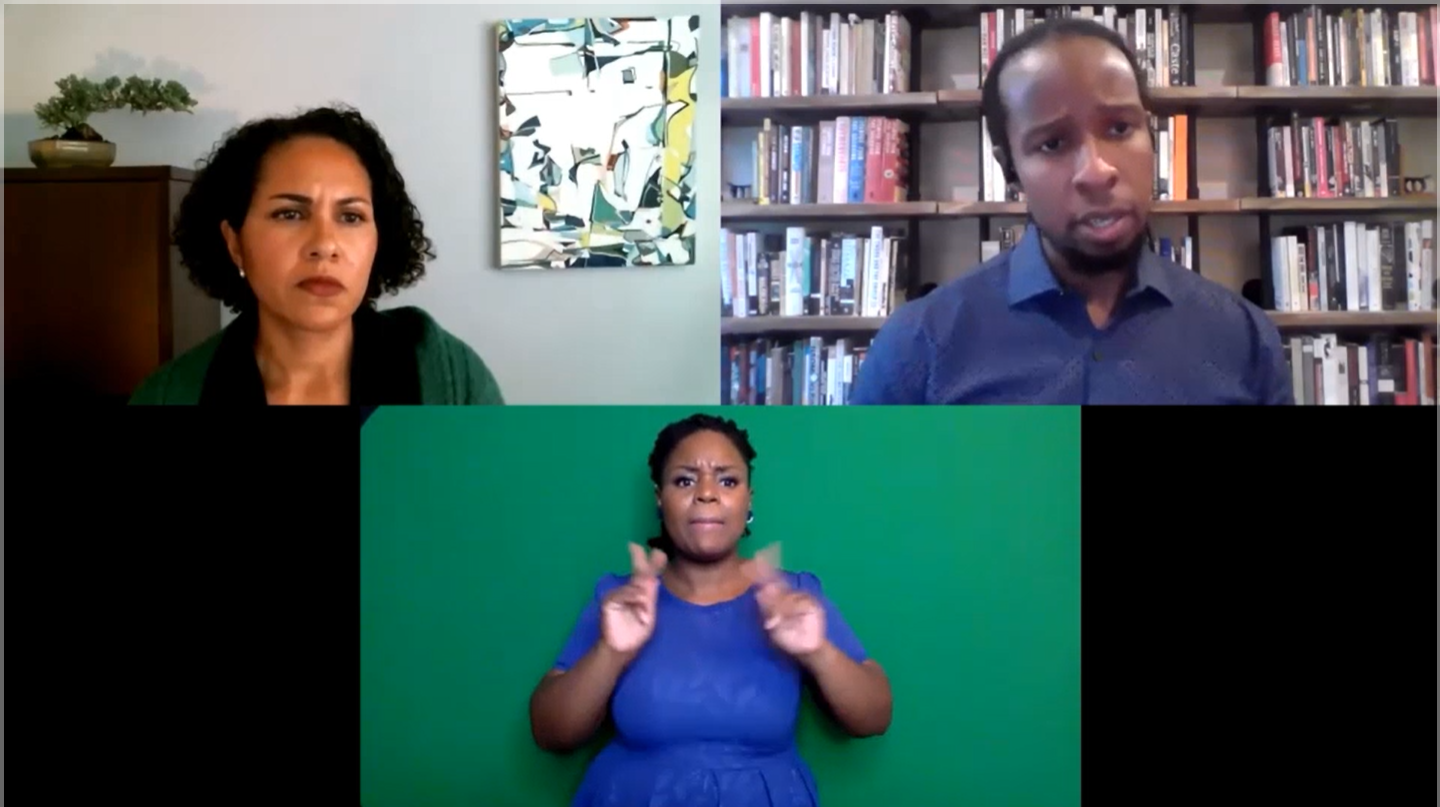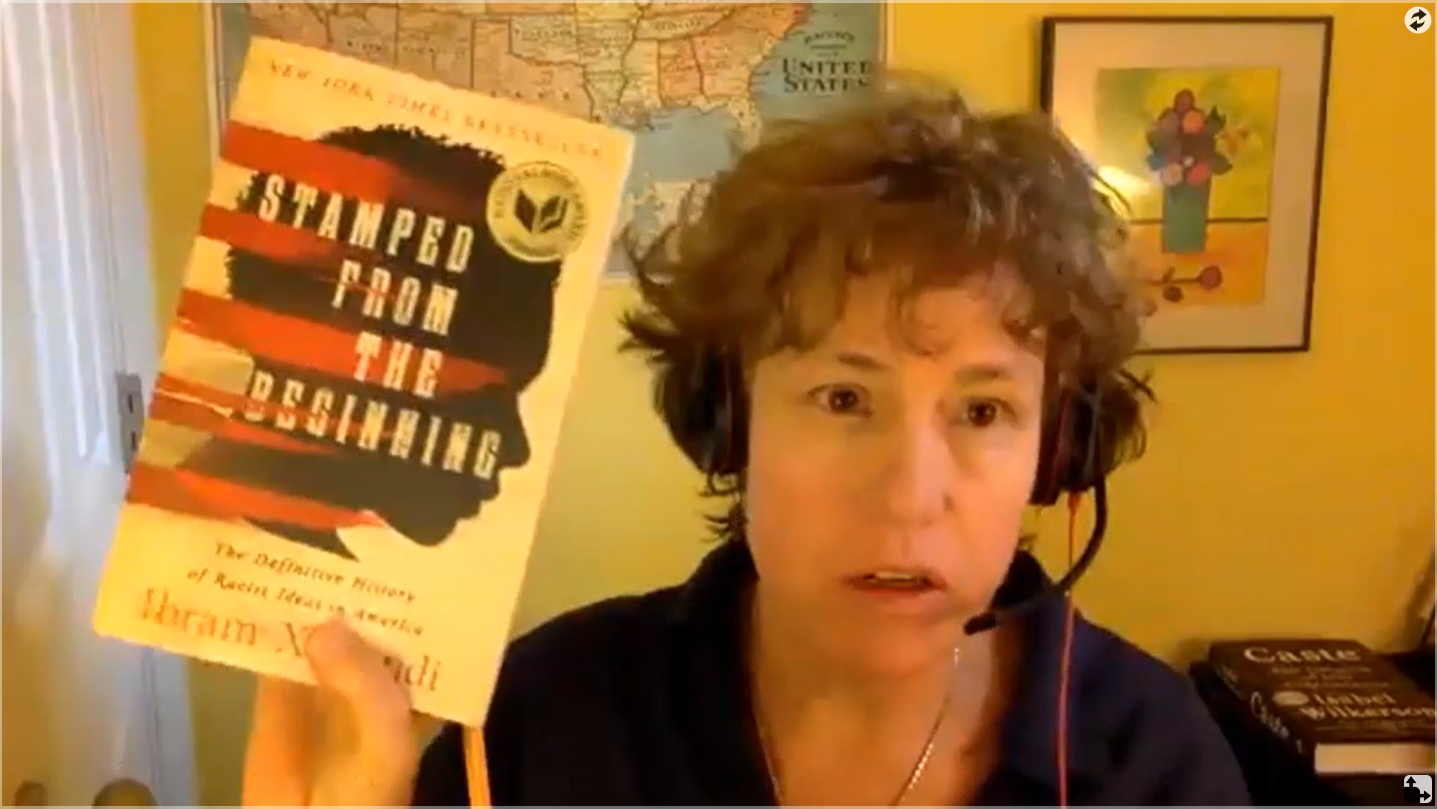
By Cynthia Hubert
Sacramento State and the nation at large are facing a “racial reckoning,” and must do more to actively confront and fight bias against people of color, speakers said during the University’s Fall 2020 Convocation.
“It is simply not enough for us not to be racist,” said Noah Marty, Associated Students Inc. (ASI) president, during the Sept. 29 virtual event. Rather, the University must commit to antiracist curriculum, policies and programs that address “an undeniable and dangerous cultural norm” that has existed throughout history, Marty said.
Amid a national conversation about racial injustice, the University is determined to make substantive changes to develop a campus where all people feel valued, said Diana Tate Vermeire, Sac State’s vice president for Inclusive Excellence. The Convocation reflects that commitment, she said.
 During the Convocation, Education Professor Mimi Coughlin suggested a book to support Sac State's antiracism goals. (Image from video)
During the Convocation, Education Professor Mimi Coughlin suggested a book to support Sac State's antiracism goals. (Image from video)Nearly 3,500 people registered for the event, which featured renowned scholars as well as Sac State faculty, staff and students. Speakers urged participants to examine any biases in their thoughts and actions, and work toward creating an institution that is antiracist in its culture, curriculum and service.
“Many throughout our country are beginning to see the reality of Black life in America,” Vermeire said, including the “indignities and trauma” people face while doing “everyday things.” The “reckoning” is occurring during a pandemic that is disproportionately affecting people of color, she said.
Sac State must “define what is possible and make it a reality” as it responds to demands for reform, Vermeire said.
As part of that process, Sac State is creating an Antiracism and Inclusive Campus Plan that will consider input and feedback from individuals from across the University, she said. A final plan is expected by the end of the Spring 2021 semester.
“Hopefully, folks left the event feeling committed to doing the work to confront racism wherever they find it, including within themselves.”
Topics likely to be addressed include hiring faculty that better reflect the diversity of the campus; helping faculty and departments build antiracism curriculum and adopt inclusive teaching practices; examining policies and practices to identify and implement changes to ensure antiracism, equity and inclusion; and increasing advocacy and partnership with the community to prevent, manage and respond to racism and bias within the Sacramento region.
During the Convocation, national experts discussed the meaning of antiracism and the impact of systemic racism in higher education. Keynote speakers were Ibram X. Kendi, author of the national bestseller How to be An Antiracist, and Shaun Harper, director of the University of Southern California’s Race and Equity Center.
The event also included breakout sessions showcasing insights from dozens of students, scholars and community organizers on issues relating to racial injustice and bias.
Videos of select Convocation sessions may be viewed on the convocation website.
John Johnson, Sac State’s director of Inclusive Excellence Learning, said he has received positive feedback about the sessions. Attendees who answered a survey generally found the Convocation to be “a valuable and important contribution to our campus programming,” he said.
“As an educator, I feel more emboldened and qualified to speak about antiracism in the classroom,” one respondent said.
“I feel proud to work for Sacramento State and have the opportunity to participate in such events,” said another.
Johnson hopes the event has a lasting impact on its audience, and said the University’s continuing efforts to enact change will make Sac State a leader in creating an antiracist environment.
“Hopefully, folks left the event feeling committed to doing the work to confront racism wherever they find it, including within themselves,” Johnson said.
“For far too long, communities of color have been pushing and fighting and advocating for institutional and social change. Those calls for change are often met with resistance from those who benefit from the status quo.”
Johnson said an opportunity exists “to come together and to build the kind of institution we want and need” for every member of the campus community.
“We cannot achieve inclusive excellence without confronting white supremacy and anti-Blackness.”
The Convocation was “an important and successful event,” Vermeire said. “But as our community has reminded us, we need action to ensure that our campus achieves our goals of being both antiracist and inclusive.
"Sacramento State is embarking on a collective planning process to identify priorities and strategies, while also taking immediate action related to resource allocation, programming and community building.”